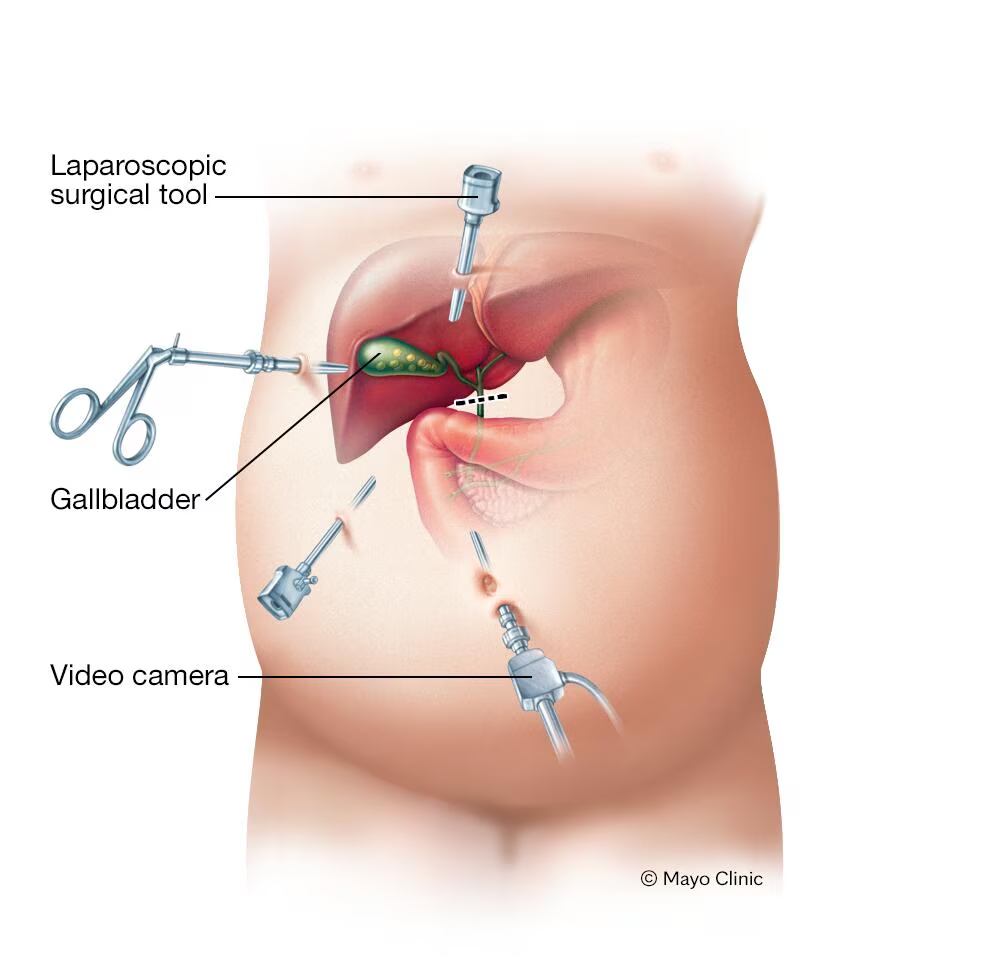
Gallstones are solid deposits that form inside the gallbladder due to an imbalance in bile components, including cholesterol, bile salts, and bilirubin. These stones can vary in size, number, and composition, and may cause pain, inflammation, or blockages in the bile ducts.
What Is the Cause of Gallstones?
Gallstones develop when bile contains too much cholesterol, bilirubin, or not enough bile salts, leading to crystallization and stone formation. Contributing factors include:
- Excess cholesterol in bile – Cholesterol-heavy diets can cause stones to form.
- Poor gallbladder emptying – If bile sits too long in the gallbladder, stones may develop.
- Excess bilirubin production – Conditions like liver disease and infections can increase bilirubin, forming stones.
What Are the First Signs of Having Gallstones?
Gallstones may not cause symptoms initially, but when they block the bile ducts, symptoms may include:
✅ Sudden, sharp pain in the upper right abdomen or center of the stomach.
✅ Pain after eating fatty meals (biliary colic).
✅ Nausea and vomiting.
✅ Bloating and indigestion.
✅ Jaundice (yellowing of the skin and eyes) in severe cases.
What Are the First Signs of a Bad Gallbladder?
A poorly functioning gallbladder can lead to symptoms like:
- Frequent abdominal pain or discomfort (especially after eating).
- Gas and bloating.
- Fatty food intolerance (feeling sick after eating greasy foods).
- Persistent nausea.
Can I Live With Gallstones?
Yes, if they are asymptomatic. However, gallstones that cause pain, infection, or blockages require medical intervention to prevent complications like cholecystitis (gallbladder inflammation), bile duct obstruction, or pancreatitis.
What Size of Gallstones Need Surgery?
📌 Small gallstones (less than 5mm): Often pass naturally without causing symptoms.
📌 Medium-sized gallstones (5mm-10mm): May cause occasional pain and should be monitored.
📌 Large gallstones (over 10mm): Higher risk of complications, often requiring surgery.
📌 Multiple gallstones: May increase the risk of gallbladder dysfunction and require removal.
Symptoms
Do Gallstones Cause Gas?
Yes. Bloating, excessive gas, and indigestion are common symptoms due to bile flow disruption.
How to Test for Gallstones at Home?
While no home test can confirm gallstones, you can look for symptoms like abdominal pain after fatty meals, nausea, and bloating. If symptoms persist, a medical diagnosis is necessary.
Can You Pass a 7mm Gallstone?
Unlikely. Small gallstones (under 5mm) may pass naturally, but larger stones (7mm+) usually require medical treatment to prevent complications.
How Are Gallstones Diagnosed?
🔍 Ultrasound – The most common imaging test for detecting gallstones.
🔍 CT Scan or MRI – Used if ultrasound results are inconclusive.
🔍 HIDA Scan – Evaluates gallbladder function.
🔍 Blood Tests – Detect infection, inflammation, or bile duct blockage.
Treatment Options for Gallstones
Gallstones treatment depends on size, severity, and symptoms. While some gallstones remain harmless, others require medical intervention or surgical removal to prevent complications.
Gallstone Removal: Cholecystectomy
A cholecystectomy is a minimally invasive laparoscopic surgery to remove the gallbladder. Since the gallbladder isn’t essential for digestion, people can live a normal life without it.
✅ Permanent solution – No risk of gallstones returning.
✅ Laparoscopic approach – Minimally invasive, faster recovery.
🔹 Hospital stay: 1 day (if laparoscopic); longer for open surgery.
🔹 Full recovery: 1–2 weeks for laparoscopic, 4–6 weeks for open surgery.
Can I Delay Gallbladder Surgery?
Yes, but only if gallstones are not causing complications. Delaying surgery may lead to:
🚨 Gallbladder infection (cholecystitis) – Requires emergency removal.
🚨 Bile duct blockage – Causes jaundice and digestive issues.
🚨 Pancreatitis – Gallstones blocking the pancreatic duct can trigger inflammation.





